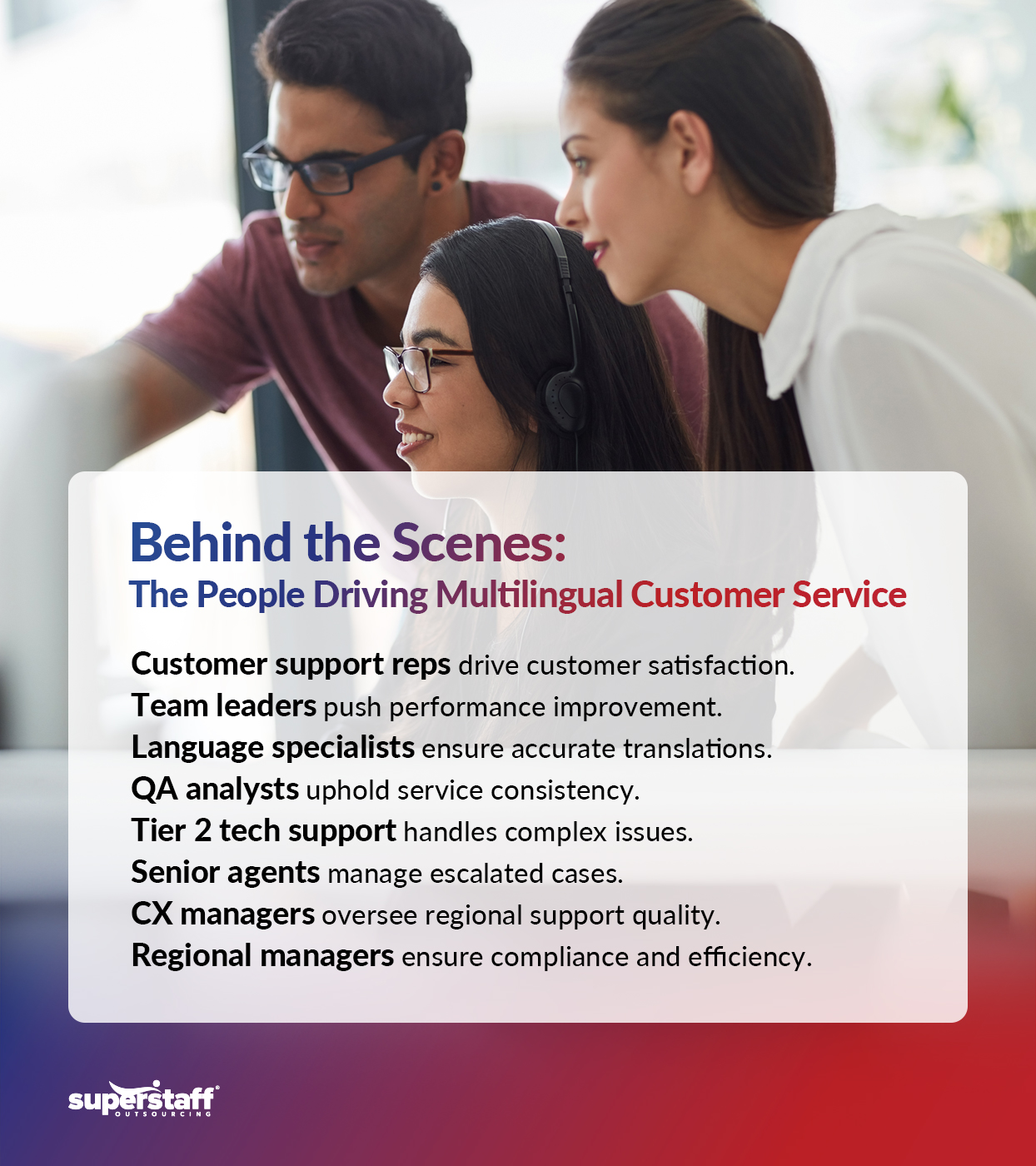
Picture this: a customer urgently needs help, but the conversation stalls due to a language barrier. Instead of getting quick support, they’re caught in a frustrating loop of misunderstood requests and unclear responses. This scenario is all too common, leaving customers feeling overlooked and dissatisfied.
As businesses expand globally, the demand for multilingual customer support becomes essential. Customers today expect to communicate in their preferred language, whether they’re seeking assistance, asking questions, or providing feedback. Meeting this expectation is no longer optional; it’s a key factor in delivering a seamless customer experience.
Outsourcing multilingual support enables companies to overcome language barriers, boost customer satisfaction, and build brand loyalty. By investing in teams fluent in multiple languages, businesses create a smoother customer journey and strengthen their foothold in diverse markets.
This article will unpack how an outsourced multilingual team functions, covering its structure, roles, processes, and the extensive benefits it brings to companies committed to serving an international audience.
Growing Demand for Multilingual Support
A recent study revealed that 9 out of 10 U.S. employers preferred multilingual speakers for their workforce. This finding underscores a pivotal shift in the business landscape. As more customers seek support in their preferred languages, companies realize that multilingual fluency is not merely a competitive advantage — it’s essential to delivering precise communication and fostering trust. Global expansion brings a unique set of customer expectations, making communicating effectively in multiple languages a critical asset.
The growth of global markets has intensified the demand for multilingual customer support. Today’s international customers expect service experiences that reflect their language preferences and cultural nuances. Meeting these expectations is not only about convenience; it’s about demonstrating a commitment to customer-centric values and building meaningful connections that resonate across borders.
Key Statistics on Language Preferences in Customer Service

To put into perspective the rapid growth of multilingual support, let’s take a look at crucial studies regarding language preferences:
- According to Forbes, 67% of consumers change brands due to ineffective customer experience.
- Another study showed that 40% of customers won’t patronize brands that don’t offer multilingual support in their native tongue, in contrast to 76% of customers who are more loyal to brands offering customer service in their native tongue.
- In addition, the same study showed that 65% of customers prefer content in their own language; even if it’s poor quality.
Impact of Language Barriers on Customer Retention
English is widely spoken in the United States, but the nation’s linguistic landscape is much more diverse. Recent studies showed that about 52.3% of the U.S. population speaks a language other than English at home. This diversity brings a unique challenge: language barriers that can significantly impact communication between your representatives and your customers.
Imagine being a customer who needs support but finds it difficult to communicate in English. Without the comfort of speaking in your preferred language, the conversation can quickly become a frustrating back-and-forth, with misunderstandings blocking the path to clear solutions. This language gap leaves customers feeling unheard and dissatisfied, emphasizing the need for multilingual support as a bridge to better service and stronger customer relationships.
With these challenges in mind, let’s explore why investing in outsourced multilingual customer support is essential for businesses looking to break down language barriers and deliver a seamless, inclusive customer experience.
Why Outsourcing Multilingual Support is a Strategic Decision
Outsourcing teams that specialize in multilingual customer service empower your business to run efficiently while meeting the demands of a diverse, global customer base. By bringing in teams fluent in multiple languages, you streamline operations and ensure your customers feel understood and valued—no matter where they’re located.
The benefits go beyond improved communication. Outsourcing multilingual support can significantly reduce costs, allowing businesses to tap into skilled talent in regions with lower operational expenses. Additionally, outsourcing providers bring specialized expertise, training their teams to handle diverse customer needs with cultural sensitivity and linguistic accuracy. This approach enhances service quality while keeping budgets in check.
Let’s explore how outsourcing multilingual support delivers substantial cost savings, boosts operational efficiency, and provides access to specialized skills that strengthen customer satisfaction across global markets.
Cost Comparisons Between In-House and Outsourced Support
Our previous article highlighted the cost differences between maintaining an in-house team and outsourcing customer support. Let’s take a closer look at these labor costs and the potential savings of outsourcing. In the Philippines, the average monthly salary is around $773, whereas in the U.S., it averages $4,500, depending on the region.
When we consider annual salaries, the cost contrast becomes even clearer. In the Philippines, salaries typically range from $10,000 to $12,000, including benefits. In the U.S., that range is much higher, between $50,000 and $70,000, also with benefits. By outsourcing support to the Philippines, businesses can take advantage of these significant cost savings while still benefiting from highly skilled, multilingual talent.
For companies seeking efficient, productive operations without sacrificing quality, outsourcing support in the Philippines provides an ideal solution, allowing you to maintain high service standards at a fraction of the cost.
Read More: How Up To 60% Savings Are Achieved By Outsourcing to the Philippines
Overview of Specialized Skills Available Through BPO Providers
- Multilingual Workforce: Outsourcing providers specialize in providing your business with a team of fluent and professional multilingual agents. An outsourcing team with a multilingual workforce will allow you to reach customers across regions and seamlessly communicate and address their needs.
- 24/7 Availability: Outsourcing teams cover all types of shifts to ensure availability for all customers at any hour. Customer concerns and issues can arise at any time of the day, including night shifts, and outsourcing provides a team capable of handling those concerns beyond regular business hours.
- Omnichannel Capabilities: Outsourcing providers specialize in omnichannel support, catered to reach multilingual support teams in platforms such as phone calls, live chats, emails, or social media, whichever is convenient for your customers.
- Personalized Services: Outsourcing providers adjust and tailor their services based on your customer’s needs, ensuring their issues can be addressed personally.
- Empathetic & Humanized Approach: Outsourcing providers ensure that support representatives are empathetic and can address customers’ concerns.
Now that we’ve discussed the key benefits, let’s expand on the various roles and responsibilities of outsourced multilingual teams.
Crucial Roles in an Outsourced Multilingual Support Team
Every role within an outsourced multilingual team is vital to delivering a successful and seamless customer support experience. The structure of these teams is carefully designed to address various customer needs with precision and efficiency. By understanding this, businesses can see how they contribute to a cohesive support system.
Let’s expand on the structure and each particular role.

Customer Support Representatives
Multilingual customer support representatives are crucial in directly engaging with customers to address their questions and concerns. They fully embody your company’s values, products, and services in their role, providing a consistent brand experience. They are also proficient in the preferred languages of your customer base, ensuring clear and effective communication. As customers’ first point of contact, these representatives are pivotal in fostering satisfaction, understanding customer needs, and preventing potential miscommunications or misunderstandings.
Team Leaders and Supervisors
Team leaders and supervisors drive the support team’s progress and effectiveness. They provide training, manage teams across various languages, and ensure that performance goals are consistently met. As guides for their teams, these leaders develop strategies to enhance service delivery and proactively address performance gaps. Their role is central to maintaining a high support standard and fostering continuous improvement.
Language Specialists or Translators
Multilingual support involves engaging with customers worldwide who have diverse inquiries and language needs. Language specialists and translators are essential to maintaining language accuracy and thorough documentation. Although customer support representatives may be fluent, occasional communication gaps can still arise, potentially leading to customer interaction misunderstandings. Language specialists actively bridge these gaps, leveraging their translation, communication, and interpretation expertise to ensure smooth and accurate exchanges between customers and representatives.
With a clear understanding of the roles in outsourcing multilingual teams, let’s explore how targeted training and development can prepare them for critical scenarios.
Training and Development for Multilingual Support Agents
Consistent training will ensure your support agents are well-equipped in their language skills, emphasizing cultural sensitivity and expertise on your products.
Language Proficiency Assessment and Ongoing Training
BPO providers prioritize ongoing training for their multilingual agents, focusing on both skill enhancement and regular evaluations to ensure continual growth and refinement. Language proficiency extends beyond basic fluency or conversational ability; it is an evolving skill where mastery directly impacts the quality of communication with customers. Maintaining high language proficiency fosters consistent customer satisfaction, which, in turn, strengthens customer loyalty and retention.
Cultural Sensitivity Training to Better Understand Customer’s Needs
Cultural sensitivity training goes beyond representatives speaking in your customers’ preferred languages, and it enables your agents to have a better and more personalized understanding of your customer’s needs and backgrounds. Cultural sensitivity allows your customer representatives to have a more profound knowledge of your customer’s cultural background, allowing them to be more informed and sensitive about their social roots and cultural traits. Understanding these cultural components provides a safe space for your customers, ensuring they feel comfortable and valued, enhancing their satisfaction and experience.
From language proficiency to cultural sensitivity, these training modules are essential to equipping your outsourced multilingual agents to provide the best customer experience possible. The next crucial step is ensuring quality assurance.
Quality Assurance and Monitoring in Multilingual Support
Quality assurance is a cornerstone for maintaining uniform service standards and consistent quality across all languages within multilingual support operations. Quality assurance analysts employ a dual-method approach to ensure that company standards and service quality are consistently met, regardless of language.
Multilingual QA Teams
Quality assurance teams meticulously review and assess customer interactions handled by multilingual agents, ensuring alignment with company policies and objectives, and sensitivity to cultural nuances. These teams monitor how outsourced agents communicate and fulfill customer needs, ensuring they accurately represent the company, meet established expectations, and deliver a polished and cohesive multilingual customer experience.
Methods for Feedback and Continuous Improvement
Continuous feedback is essential for constant growth. Think of your multilingual support representatives as hosts or public speakers: their skills improve over time with consistent practice. Integrating feedback into this practice allows them to address specific performance areas for improvement while reinforcing strengths that drive growth. A standardized approach to feedback—through key performance indicators (KPIs), metrics, and a formal document—provides a reliable reference for you and your outsourced multilingual team, establishing a foundation for performance assessment and continuous improvement.
While quality assurance fosters consistency and growth, specialized technical support is equally crucial in advancing the effectiveness of multilingual customer support.
Specialized Technical Support for Complex Issues
Technical issues often bring unique challenges that require a blend of specialized knowledge, technical expertise, and language proficiency. In addition to technical skills, multilingual capability is vital for delivering support that bridges language gaps. This combination allows support agents to tackle the technical and linguistic dimensions of customer concerns, fostering clear communication and efficient resolution.
Role of Tier 2 and Tier 3 Technical Support Teams
Multilingual tech support teams are essential for serving a global customer base. Imagine, as a customer, facing a tech issue or product instructions in a language you don’t understand; you might need third-party translations just to interpret the manual or instructions. Multilingual technical support plays a key role here by addressing advanced technical issues in the customer’s preferred language. By combining deep technical expertise with the ability to overcome language barriers, these teams enable effective global and 24/7 support, enhancing the customer experience and ensuring successful resolution of technical concerns.
Language-Specific Sub-Teams
Building a team of language-specific technical support agents enables you to address region-specific issues more effectively. These specialized teams help create a more organized and efficient technical support operation, allowing customers to connect with representatives who understand their language preferences. This approach not only fosters a more diverse support environment but also streamlines personalized technical assistance, enhancing customer satisfaction.
With technical support in place, let’s now examine how escalation management contributes to success in multilingual customer support.
Effective Escalation Management in Multilingual Support
In certain cases, your frontline multilingual support agents may encounter issues that exceed their scope of expertise. This is where escalation management becomes essential. Escalation support steps in to address complex matters that go beyond the control or capacity of standard support, ensuring that all customer concerns are resolved effectively and efficiently.
Senior Agents With Multilingual Skills for Handling Escalated Cases
Senior representatives oversee escalation support, managing cases that are rare and demand a specialized, refined approach. To address these complex scenarios, BPO providers work closely with regional support teams and central management. For example, when a technical issue becomes especially intricate, escalating it to senior representatives within the technical support team enables a more thorough and expert resolution.
As we look to refine solutions and enhance customer experiences, AI and chatbots play a vital role in advancing multilingual interactions, providing immediate assistance and streamlining communication.
AI and Chatbots for Multilingual Customer Service
AI and chatbots are designed not to replace human interactions in multilingual customer service but to enhance and support them. These tools provide automation while maintaining the cultural sensitivity and language accuracy essential to effective multilingual support. By handling routine inquiries, they allow human agents to focus on more complex issues, creating a seamless blend of technology and personalized service.
AI-Powered Language Recognition and Support
Zendesk revealed in their data that 73% of CX leaders express that AI will fuel CX interactions. The objective of AI is to enhance productivity and customer service. By gathering the most FAQs and basic queries, AI-powered support can foster convenience and maintain the human-centered support needed to meet your customer’s needs as efficiently as possible. Experts also program AI and chatbots to understand personalized experiences and recognize required languages.
Management and Fine-Tuning of Chatbots
Despite AI-powered support being capable of fostering human-centered support, it is far from perfect. AI remains powered by machine learning and technology; hence, it will never replace the empathy and cultural sensitivity human support provides. Because of this, BPO providers make it a point to fine-tune AI-powered chatbots to ensure culturally appropriate and sensitive responses and queries.
Moving on from the advantages of AI and chatbots, let’s understand CX managers’ strategic role as they oversee multilingual support and promote its success.
Role of Customer Experience Managers (CXMs) in Multilingual Support
CX managers are pivotal in managing multilingual support operations, ensuring customer satisfaction is consistent across diverse regions and languages. Their role goes beyond supervision; they actively strategize, implement, and refine processes to create seamless customer interactions worldwide.
These managers monitor key performance indicators (KPIs) to evaluate service quality and identify areas for improvement. Analyzing feedback and customer interactions ensures that language-specific nuances are addressed, fostering a culturally sensitive and personalized approach to service. They also collaborate closely with team leads and quality assurance specialists to maintain high standards and align operations with business goals.
Coordination Between Local Language Teams and Central Management
The primary goal of coordination between local language teams and central management is to create a continuous feedback loop that drives consistent performance and improvement. This collaboration ensures that both teams align their efforts while addressing their unique responsibilities to enhance customer satisfaction across all regions.
Local language teams meet customer expectations by delivering personalized service tailored to cultural nuances and language preferences. Their role involves understanding the subtleties of customer communication ensuring interactions feel natural, empathetic, and responsive to individual needs.
Meanwhile, central management takes a broader view, setting strategic objectives and monitoring progress toward achieving them. They ensure that each step in the process supports organizational goals while maintaining high service standards. They empower local teams to succeed in their day-to-day operations by providing oversight, resources, and guidance.
This synergy between local expertise and centralized strategy fosters a cohesive approach to multilingual support, enabling businesses to deliver exceptional customer experiences globally.
Setting and Tracking Regional Customer Experience Goals
Setting clear, realistic goals and metrics for customer experience managers (CXMs) and multilingual support teams is essential for driving success. One practical framework for establishing these objectives is the SMART method, which emphasizes creating Specific, Measurable, Achievable, Relevant, and Time-bound goals.
Begin by identifying specific goals. What outcomes do you want to achieve through your multilingual services? Whether improving customer satisfaction, reducing resolution times, or enhancing personalized service, having a precise aim is critical. Then, make these goals measurable. Establish key performance indicators (KPIs) and specific benchmarks for your managers and multilingual teams to track progress. This ensures you can evaluate success and identify areas for improvement.
Next, focus on keeping your goals realistic and achievable. Set targets that align with your current resources and operational capacity to ensure teams remain motivated and focused. Finally, set a timeline for each goal. Determine a clear deadline to maintain accountability and prioritize actions that contribute to achieving your customer experience objectives.
With CXMs responsible for overseeing the execution of these goals, it’s also essential to consider the contributions of regional support managers. These leaders are vital in coordinating multilingual efforts across different geographic areas, ensuring seamless service delivery while aligning with overarching business strategies. Let’s explore their responsibilities in greater detail.
Regional Support Managers for Multilingual Operations
In addition to collaborating with customer experience managers (CXMs), regional support managers are crucial in ensuring smooth operations by aligning regional regulations with cultural standards. Their efforts are essential to meeting customer expectations and maintaining service quality across diverse markets.
Regional support managers bridge the gap between compliance and cultural sensitivity by tailoring strategies to fit local norms and legal requirements. This alignment ensures that customer interactions not only meet regulatory standards but also resonate with the region’s cultural preferences. Through their oversight, businesses can deliver personalized and meaningful experiences that build customer trust and loyalty.
This dual focus on regulatory alignment and cultural adaptation highlights the importance of regional support managers in driving consistency and excellence in multilingual customer support. Their role complements that of CXMs, ensuring a cohesive approach to meeting global customer needs.
Overseeing Regional Language Teams To Ensure Compliance and Efficiency
Regional support managers are highly qualified leaders tasked with supervising region-specific teams to ensure efficient performance while maintaining compliance with legal and operational requirements. Their leadership provides teams with clear guidance, standardized procedures, and actionable goals, enabling them to deliver consistent and effective multilingual support services.
Regional support managers create a framework that seamlessly empowers teams to meet customer expectations by establishing best practices and ensuring adherence to organizational standards. They also play a critical role in maintaining the quality of services, ensuring that every interaction reflects the company’s commitment to excellence.
This balance of operational oversight and customer-centric focus highlights the importance of regional support managers in fostering trust, satisfaction, and efficiency within multilingual support teams.
Reporting to Global Operations and Customer Experience Leaders
Regional support managers oversee the operations and performance of their specific regions, ensuring service quality and operational efficiency. They report directly to global operations managers and customer experience (CX) heads and provide key insights and updates on their region’s overall performance.
While regional support managers focus on the day-to-day management and quality assurance within their assigned areas, global operations and CX heads take a broader view. They monitor and evaluate CX performance across all regions, ensuring alignment with the company’s international objectives. This division of responsibilities allows for localized focus while maintaining a unified strategy.
Collaboration between regional and global leaders is critical to meeting and exceeding customer expectations. Together, they ensure that service standards are consistently high, operations are efficient, and customer satisfaction is achieved globally.
Foster Cultural Sensitivity and Break Language Barriers With SuperStaff
Outsourcing multilingual customer services offers many advantages, starting with a team of fluent professionals who bridge language barriers and enhance customer communication. From cost savings to access to specialized support roles and experienced global managers, outsourcing positions your business to meet international demands while standing out in a competitive market.
Partnering with SuperStaff provides a strategic pathway to success through expertly designed multilingual outsourcing solutions. Whether you need a team of highly skilled multilingual representatives or seek collaboration with seasoned regional and CX managers, SuperStaff is equipped to meet your needs. Work with us to create a diversified, customer-focused experience that drives global satisfaction and growth. Connect with us today to take your customer service to the next level!






